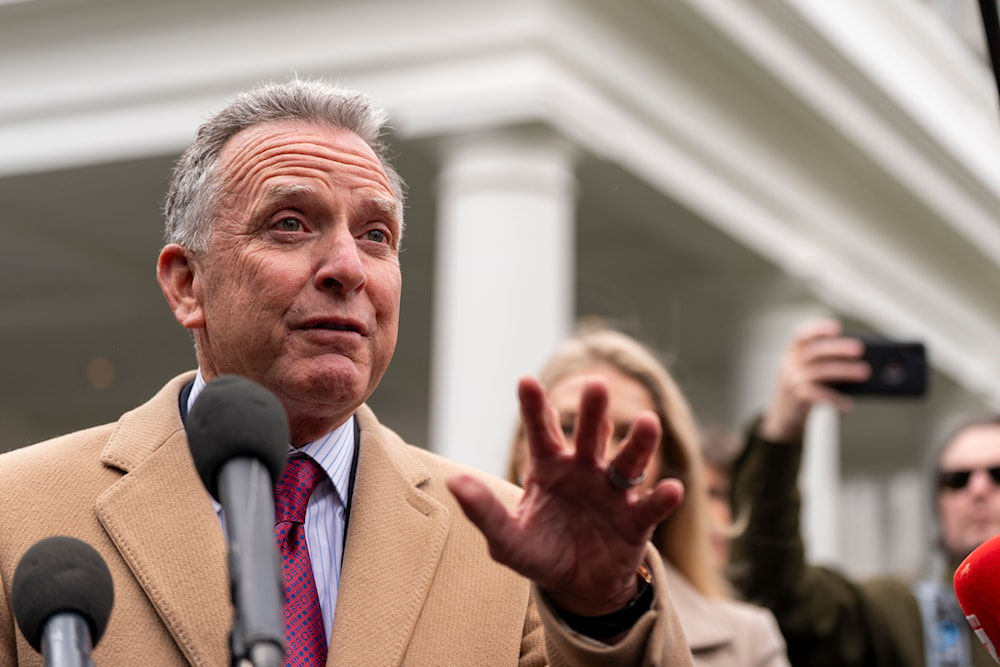White House envoy to travel to Doha to push for new Gaza deal: Axios
White House envoy Steve Witkoff is heading to Doha to mediate a new deal for captive releases and a ceasefire between "Israel" and Hamas.
-

Steve Witkoff, White House special envoy for the Middle East, accompanied by White House press secretary Karoline Leavitt, speaks with reporters at the White House, on March 6, 2025, in Washington. (AP)
An Axios report on Sunday revealed that White House envoy Steve Witkoff is set to travel to Doha on Tuesday evening to mediate a new deal for the release of captives and a ceasefire between the Israeli occupation and Hamas movement, according to two US officials.
According to the report, this will be the first round of talks since Trump took office, and the first since the original agreement— which secured a 42-day ceasefire in exchange for releasing 33 captives— concluded a week ago.
Witkoff will join Qatari and Egyptian mediators, along with negotiators from both "Israel" and Hamas, to begin discussions on Monday. That said, the Trump administration is seeking a deal that ensures the release of all remaining captives, extends the ceasefire through Ramadan and Passover, and aims for a "long-lasting solution."
On that note, 59 Israeli captives remain in Gaza, with 35 confirmed dead by the Israeli occupation.
Witkoff is scheduled to travel to Doha after attending a US-Ukraine meeting in Saudi Arabia on Tuesday. However, according to the report, it's uncertain whether he'll meet with Hamas directly or only with Israeli and Qatari officials, as well as Egyptian mediators.
A senior Israeli official mentioned that Witkoff intends to bring all parties together for intense negotiations over several days in hopes of reaching a deal. Meanwhile, a Hamas delegation held talks with Egyptian officials in Cairo on Saturday regarding the Gaza ceasefire and prisoner negotiations.
Hamas has urged the parties to stick to the original deal and begin discussions on its second phase, which Israel has yet to seriously engage with.
The Resistance group also conveyed its readiness to form a committee of "national independent personalities" to govern Gaza until elections are held, a move that would relinquish its control over the area's civilian governance.
Israeli Prime Minister Benjamin Netanyahu convened senior ministers and security chiefs on Saturday to strategize the next steps for the Gaza deal. His office confirmed that "Israel" accepted the mediators' invitation and will send a delegation to Doha on Monday to advance the negotiations.
Hamas approves Gaza governance plan
On Saturday, Hamas' negotiating team finalized its trip to Egypt, where the delegation discussed pathways for the implementation of the clauses of the ceasefire agreement with mediators.
The delegation, headed by Mohammad Darwish, head of Hamas' Shura Council and Chairman of its Leadership Council, held talks with the head of Egypt's General Intelligence Service, Major General Hassan Rashad. The two sides discussed several crucial issues, including the ceasefire agreement and the prisoner exchange deal.
A statement released by the Hamas Media Office described the talks as "positive and responsible."
"The Hamas delegation expressed its gratitude and appreciation for Egypt's efforts, especially in countering displacement plans," the Palestinian Resistance movement said, referring to United States President Donald Trump's plot to "take over" the Gaza Strip.
Welcoming the outcomes of the most recent Arab summit, Hamas highlighted Egypt's Gaza reconstruction plan and the Palestinian people's inalienable right to statehood.
In further detail, Hamas' negotiating team emphasized the need to uphold the terms of the multi-phase ceasefire agreement between the Palestinian Resistance and "Israel".
The Israeli regime continues to blatantly violate the agreement, which includes the delivery of large amounts of humanitarian aid to the Gaza Strip, as well as multiple acts of aggression against civilians.
Most importantly, the Israeli government ignored a time limit to enter negotiations for the second phase of the agreement, which would have secured the release of the remaining Israeli captives and a lasting ceasefire in the Gaza Strip.
"The delegation emphasized the need to uphold all terms of the agreement, immediately commence negotiations for the second phase, reopen border crossings, and allow the unrestricted entry of humanitarian aid into Gaza," the statement underlined.

 4 Min Read
4 Min Read








